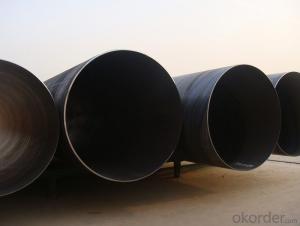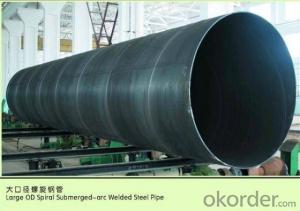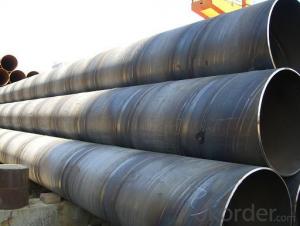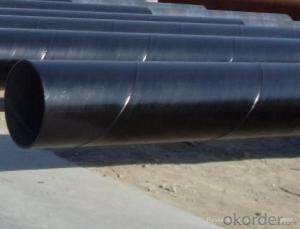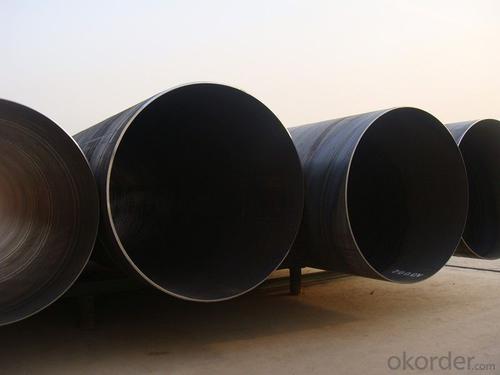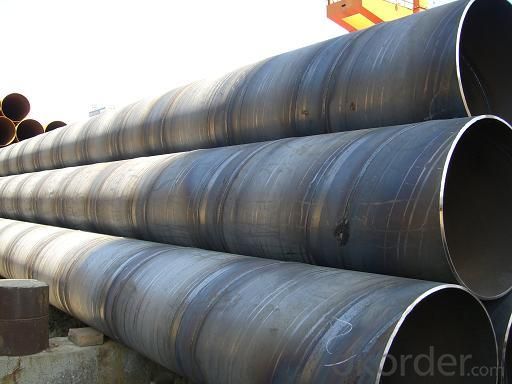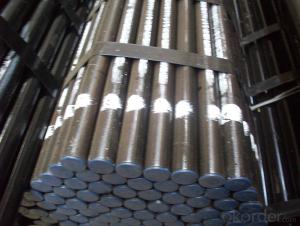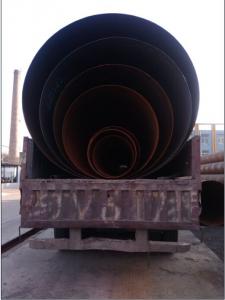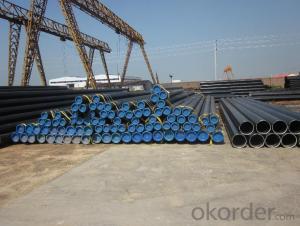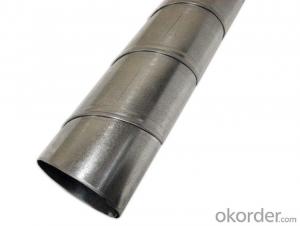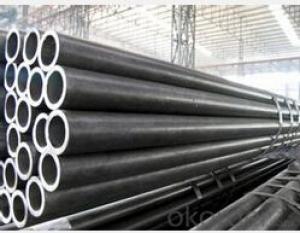SPIRAL CARBON STEEL PIPE ASTM API
- Loading Port:
- China Main Port
- Payment Terms:
- TT OR LC
- Min Order Qty:
- -
- Supply Capability:
- -
OKorder Service Pledge
OKorder Financial Service
You Might Also Like
Packaging & Delivery
Packaging Detail: | standard export packing or as customer's requirement |
Delivery Detail: | within 10 - 30 days |
Specifications
Spiral Welded Steel Pipes and Tubes
1.Material:Q195-Q235
2.Length:1-12m
3.WT:1.0-14mm
4.O.D.:20-273mm
Spiral Welded Steel Pipes and Tubes
Product Description:
1.Material : Q235,Q345,L245,L290,L360,L415,L450,L485,GrB,X42,46,X52,X56,X60,X65,X70,X80,X100
2,Standard: SY/T5037-2000,GB/T9711-2011,API Spec 5L PSL1/PSL2,ASTM A252\A53,ISO3183,DIN17172,EN10217,JIS G3457,AWWA C200,ASTM A139,ASTM A671,ASTM A672
3.Wall thickness: 3.0mm-30mm
4.Outer diameter: φ168mm-3020mm
5,Length: 5m-12m or as your requirement
6,Corrosion protection standard: DIN30670,DIN30671, AWWAC210, AWWA C203, SY/T0413-2002,SY/T0414-2002
7,Application: Oil, gas, natural gas, water pipe, thermal electricity pipe, steel structure engineering, etc
Q195-q345 Material Steel Pipe's Materials
Elements | Chemical Compsition% | Mechanical Property | ||||||
| C% | Mn% | S% | P% | Si% | Yield Point (Mpa) | Tensile Strength(Mpa) | Elongation |
Q195 | 0.06-0.12 | 0.25-0.50 | <0.050 | <0.045 | <0.030 | >195 | 315-430 | 32-33 |
Q215 | 0.09-0.15 | 0.25-0.55 | <0.05 | <0.045 | <0.030 | >215 | 335-450 | 26-31 |
Q235 | 0.12-0.20 | 0.30-0.70 | <0.045 | <0.045 | <0.030 | >235 | 375-500 | 24-26 |
Q345 | <0.20 | 1.0-1.6 | <0.040 | <0.040 | <0.55 | >345 | 470-630 | 21-22 |
- Q: How to make the magnetic steel, can be like a magnet?
- Of course, not all materials can be magnetized, austenitic stainless steel will not do.
- Q: What are the common fittings and accessories used with steel pipes?
- Some common fittings and accessories used with steel pipes include couplings, elbows, tees, reducers, flanges, and valves. Additionally, accessories such as pipe hangers, brackets, clamps, and gaskets are often used to support and secure the pipes.
- Q: How are steel pipes protected against underground corrosion?
- Steel pipes are typically protected against underground corrosion through various methods such as coating the pipes with corrosion-resistant materials like epoxy or polyethylene, cathodic protection using sacrificial anodes or impressed current systems, and regular inspection and maintenance to detect and address any signs of corrosion.
- Q: How are steel pipes used in the manufacturing of offshore wind turbines?
- Steel pipes are used in the manufacturing of offshore wind turbines for various purposes such as supporting the turbine structure, housing electrical cables, and transporting fluids like hydraulic oil and cooling water. These pipes provide structural strength, corrosion resistance, and durability, ensuring the stability and functionality of the turbines in the harsh offshore environment.
- Q: What is the purpose of steel pipes?
- The purpose of steel pipes is to transport fluids and gases, facilitate the flow of water, oil, and natural gas, and provide structural support in various industries such as construction, plumbing, and manufacturing.
- Q: What are the different methods of pipe joining for steel pipes?
- Steel pipes can be joined using various methods, each with its own benefits and drawbacks. These methods include: 1. Butt Welding: Two steel pipes are welded together by beveling or facing their ends to form a V-groove. Molten metal is then used to fill the groove, creating a strong and long-lasting joint. 2. Socket Welding: A socket is welded onto the end of a steel pipe, and another pipe is inserted into the socket and welded in place. This method creates a leak-proof and corrosion-resistant joint. 3. Threaded Joint: Steel pipes can be joined by threading the ends and using a threaded coupling or union to connect them. This method is commonly used for smaller pipes and allows for easy disassembly and reassembly. 4. Flanged Joint: For larger pipes, a flange is attached to the end of each pipe, and the flanges are fastened together with gaskets using bolts. This method is commonly used in industries such as oil and gas, water treatment, and chemical processing. 5. Grooved Joint: Grooving machines are used to create a groove on the outside of the pipe. A coupling or fitting is then inserted into the groove and secured with bolts or clamps. This method is quick to install and allows for easy disassembly and reassembly. The choice of pipe joining method depends on factors such as pipe size, application, and desired strength and durability. Each method has its own advantages and disadvantages.
- Q: Are there specifications for scaffold steel pipe with 48mm * 3.2mm?
- Previously used steel pipe GB 51*3.0mm, the latest national standard JGJ130-2001 stipulates that the use of steel pipe for construction projects need to be 48*3.5mm specifications, the wall thickness should be 3.5mm square for qualified products.
- Q: What are the different types of supports used for steel pipes?
- The different types of supports used for steel pipes include pipe clamps, pipe hangers, pipe saddles, and pipe rollers. These supports are designed to securely hold and suspend the steel pipes in place, ensuring proper alignment and preventing sagging or movement.
- Q: How are steel pipes made?
- Steel pipes are made through a process called pipe manufacturing, which involves multiple steps. Firstly, raw steel is melted in a furnace and then subjected to continuous casting to form a solid billet. This billet is then heated and pierced to create a hollow tube called a shell. Next, the shell is rolled and stretched to the desired diameter and thickness using a series of rollers. The pipe is then subjected to a process called welding, where two edges of the shell are fused together to create a seamless or welded pipe. Finally, the pipe undergoes various finishing processes such as cutting, straightening, and inspection before being ready for use.
- Q: What does "buried steel pipe" 6*2SC100 mean?
- The embedded steel pipe 6*2SC100 refers to a welded steel pipe with 2 pipe thicknesses of 6mm and a diameter of 100mm. SC pipe means welded steel pipe. Embedment means pre installation (burial).
Send your message to us
SPIRAL CARBON STEEL PIPE ASTM API
- Loading Port:
- China Main Port
- Payment Terms:
- TT OR LC
- Min Order Qty:
- -
- Supply Capability:
- -
OKorder Service Pledge
OKorder Financial Service
Similar products
Hot products
Hot Searches
Related keywords
